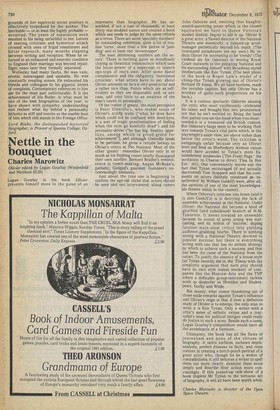Nettle in the bouquet
Charles Marowitz
Olivier edited by Logan Gourlay (Weidenfeld and Nicolson £3.25) Logan Gourlay in his book Olivier presents himself more in the guise of an
impresario than biographer. He has assembled, if not a cast of thousands, at least thirty star-studded names and created a book which one tends to judge by the same criteria as a revue. There are some 'specialty numbers' by outstanding celebrities, quite a lot of routine 'turns', more than a few pieces of 'padding' and at least one 'showstopper'.
The least interesting numbers are the actors'. There is nothing quite so mindlessly cloying as theatrical reminiscence which uses the boost-power of a superstar to launch ego-trips of one's own. After some banal compliments and the obligatory 'restrained criticism', what actors have to say about Olivier amounts to: he's a very good actor and a rather nice chap. Points which are as selfevident as they are disputable and, in any case, add very little to an analysis of the man's talent or personality.
Of the 'roster of greats', the most perceptive is Peter Glenville's, who makes sense of Olivier's actirtg traits ("what he does have which could not be confused with dead eyes, is a sort of tragic anesthetisation of feeling when the eyes go balefully dead") and his peronality-drives ("he has big, healthy appetites, among which is greed-greed for achievement"), and although Glenville tends to be partisan, he gives a certain leeway to Olivier's critics at The National. Most of the other 'greats' remember Olivier only in so much as his flashing comet briefly illuminated their own satellite. Bernard Braden's reminiscence is vomit-making; Angus McBean's, pathetic; Gielgud's guarded; Guinness's unconvincingly adulatory.
Just about the time one is beginning to confirm the age-old cliche that actors should be seen and not interviewed, along comes John Osborne and, emitting that haughty, nostril-quivering prose which is the closest equivalent we have to Queen Victoria's studied disdain, begins to stir it up. Olivier is a great actor, a flawed director of the National Theatre and essentially, a jumped-up actormanager pathetically beyond his depth. (The overstated paraphrases are my own.) He indicts Olivier for attempting to be 'trendy' (The cardinal sin for Osborne) in wooing Royal Court stalwarts to the gestating National and for surrounding himself with Broadway-styled intellectuals like Ken Tynan. (The best photo in the book is Roger Law's model of a chimp-like Tynan growing out of Olivier's Richard III hump. We all have burdens, reads the invisible caption, but only Olivier has a back.) of quite such proportions on his .) It is a curious spectacle: Osborne abusing the critic who most vociferously celebrated his talent and brought him into prominence; not that he isn't entitled to: Biting the hand that patted-you-on-the-head-when-you-mostneeded-it is a treasured old British custom. But Osborne's fangs seem to be working their way towards Tynan's vital parts which, in the playwright's snide view, are above rather than below the critic's waist. The criticism is swingeingly unfair because only an Olivier born and bred on Shaftesbury Avenue values would have acceded to Tynan's more Establishment tendencies ('The Front Page,' the invitation to Charon to direct 'Flea In Her Ear,' etc). One conveniently leaves out the fact that Tynan encouraged (if not actually discovered) Tom Stoppard and that his comments on actors (blithely construed as 'interference' by William Gaskill) were, after all, the opinions of one of the most knowledgeable theatre minds in the country.
Where Osborne's criticism hits home (and it is also Gaskill's) is in decrying the lack of ensemble achievement at the National. Under Olivier, the National did become a kind of glorified (and subsidised) branch of H.M. Tennents. It never created an ensemble because its notion of great acting was starcasting, and its notion of 'success,' duping fatuous main-stem critics into yielding audience-grabbing blurbs. There is nothing wrong with a National Theatre devoted to popular success; but there is everything wrong with one that has no artistic strategy by which to achieve such a success, and that has been the curse of the National from the outset. To justify the absence of a house-style (as Tynan recently did in the Times) with the simplistic argument that each play should have its own style makes mockery of companies like the Moscow Arts and the TNP where a definable group-instrument tackles .wor kaGsodrkisy d Wilde. and Shakespeare,
mainly, what comes thundering out of those snide remarks against Tynan's influence and Olivier's reign is that if ever a definitive study of Olivier is to emerge, the only man to write it is Ken Tynan. Only a writer with a critic's sense of esthetic values and a journalist's nose for political intrigue could really do justice to such a story. Beside such a tome, Logan Gourlay's compendium would have all the avoirdupois of a footnote.
Ultimately, the book has all the flaws of journalism and none of the virtues of biography. It skirts surfaces, eschews depthanalysis, prefers frissons to facts, and rests content in creating a hotch-potch portrait of a great actor who, though he be a welter of contradictions, it still behoves a writer to spell them out more clearly, examine them more deeply and describe their action more convincingly. If this jazzed-up talk-show of a book inspires Mr Tynan to the tortuous act of biography, it will all have been worth while. Charles -Marowitz is director of the Open Space Theatre.










































 Previous page
Previous page